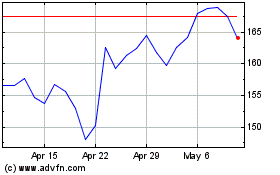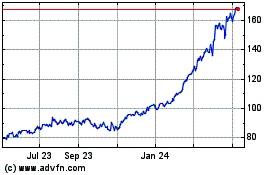GE Expects Coronavirus To Cut Into Cash Flow -- WSJ
March 05 2020 - 3:02AM
Dow Jones News
By Thomas Gryta
This article is being republished as part of our daily
reproduction of WSJ.com articles that also appeared in the U.S.
print edition of The Wall Street Journal (March 5, 2020).
General Electric Co. said the coronavirus epidemic would reduce
the company's first-quarter free cash flow by $300 million to $500
million, but backed its full-year target for the closely watched
metric.
The company still expects to generate positive cash flow between
$2 billion and $4 billion for the full year from its industrial
operations. Cash flow is essentially the money left after a
business pays its bills and makes investments.
"We have conviction in the broad outline for 2020," Chief
Executive Larry Culp said. The company's outlook regarding the
virus, which has disrupted global travel and production in China,
is based on the facts known today. "What we don't know outweighs
what we do know at this time, " Mr. Culp told investors Wednesday.
The impact isn't included in the 2020 estimates beyond the first
quarter.
"We aren't going to try to look into the crystal ball that none
of us have," he said in an interview.
GE still targets 2020 adjusted earnings of 50 cents to 60 cents
a share and continues to expect the roughly $21 billion sale of its
biopharma business to Danaher Corp. to close by month's end.
Analysts expect 2020 adjusted earnings of 59 cents a share,
according to FactSet.
The company also named former Defense Secretary Ash Carter to
its board, subject to approval at its May shareholder meeting.
GE's outlook assumes Boeing Co.'s grounded 737 MAX resumes
flying midyear. A GE joint venture with Safran SA of France makes
the engines used on the jet, and GE has cautioned the production
halt could pressure its cash flow. Recently, Boeing promised to pay
its engine suppliers for all deliveries by the end of 2021.
David Joyce, the head of GE's aviation business, said the recent
agreement with Boeing to cover payments for engines used on the
737-MAX and set the pace of production for 2020 has left more
capacity than needed. He said the division put a hiring freeze in
place, is cutting costs and will use some of the capacity to
"improve our fulfillment in places where our supply chain is
constrained."
The division is experiencing some virus-related air-traffic
slowdowns in the Asia-Pacific region. Air traffic on planes with
the division's engines is down 60% in China since late January, GE
said.
Mr. Culp said the Boeing engine agreement isn't directly
offsetting cash lost from virus-related pressure, but does provide
some certainty for the division. GE reported a $1.4 billion
cash-flow reduction in 2019 from engines delivered to Boeing that
weren't paid-in-full because final delivery of planes ceased. He
said GE wasn't going to disclose the details of the deal.
The Power division, which has suffered in recent years because
of poor deals and misjudging changes in demand for
natural-gas-fueled power generation, expects margins to expand over
the next two years and positive cash flow for 2021.
Mr. Culp, who has been chief executive for almost 18 months,
said GE burned through about $1.7 billion in cash in recent years
related to spending decisions and outstanding liabilities from the
2015 acquisition of Alstom SA's power business. The remaining costs
will burn $300 million to $400 million a year, but will be gone by
2022, he said.
Costs from GE's large corporate operation will drop by $700
million in the next two years, Mr. Culp said. Last year, the
company transferred 8,500 people from the corporate group to the
individual businesses, which will make their own decisions about
cutting or retaining those costs.
Regarding the coronavirus, GE said all but two facilities in
China are restarted but it noted reduced operating capacity. The
company has about 18,000 workers in China, which brings in about 9%
of annual revenue for its industrial divisions. GE is experiencing
some disruption within China, along with logistical issues that
make it harder to move products.
Mr. Culp said GE's global workers are the primary focus: The
company has reinforced hygiene practices and limited travel to
certain areas. The health-care division is also a concern, because
some workers are on the front lines of the epidemic delivering
equipment and supplies, along with servicing machines such as CT
scanners in the area.
The virus is affecting Mr. Culp's own behavior, he said. His
team has been implementing a no-handshake policy. "There have been
a few forearm and elbow bumps here and there in recent days," he
said. "We are trying to do the best we can without
overreacting."
Write to Thomas Gryta at thomas.gryta@wsj.com
(END) Dow Jones Newswires
March 05, 2020 02:47 ET (07:47 GMT)
Copyright (c) 2020 Dow Jones & Company, Inc.
GE Aerospace (NYSE:GE)
Historical Stock Chart
From Aug 2024 to Sep 2024

GE Aerospace (NYSE:GE)
Historical Stock Chart
From Sep 2023 to Sep 2024
